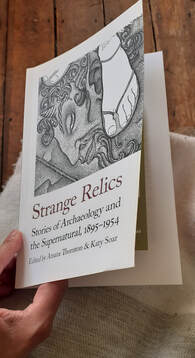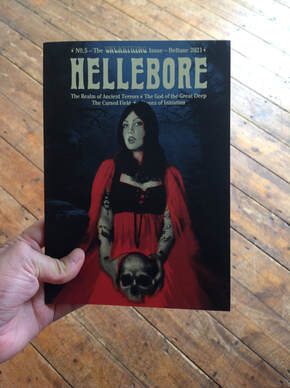Right at the end of the September my latest Beyond Notability blog post was published. 'Modelling Excavations with Wikibase' explores how we have created a model for representing excavations on our Wikibase site, enabling us (where we have the data) to show that excavations are a community. Examples include excavations at Colchester, Essex in the 1930s, and Saqqara, Egypt in the 1900s, drawing on information archaeological reports and popular periodicals.
|
By Amara Thornton
Right at the end of the September my latest Beyond Notability blog post was published. 'Modelling Excavations with Wikibase' explores how we have created a model for representing excavations on our Wikibase site, enabling us (where we have the data) to show that excavations are a community. Examples include excavations at Colchester, Essex in the 1930s, and Saqqara, Egypt in the 1900s, drawing on information archaeological reports and popular periodicals. By Amara Thornton This month's big news is that a project two years and a few lockdowns in the making has finally come to fruition! Strange Relics, an anthology of classic supernatural stories with an archaeological twist that I have co-edited with Dr Katy Soar, has been published by Handheld Press. One of the inspirations behind the development of the project was my post from October 2019, #ExcavationGothic. It started an avalanche of sorts - brought me a great collaborator, Dr Katy Soar, and led me down the rabbit hole of digitised copies of Weird Tales. I hope you enjoy it as much as I have in working with Katy to bring it together! Strange Relics is available to order through Handheld Press: www.handheldpress.co.uk/shop/fantasy-and-science-fiction/strange-relics-stories-of-archaeology-and-the-supernatural/
By Amara Thornton
My post for this month on the Beyond Notability website explores the many ways in which we are approaching work, through the life of Welsh antiquarian Gwenllian Morgan. We've had some lively discussions about how we represent work, and I'm sure there are more to come! Read the post "Working with Gwenllian Morgan" here: beyondnotability.org/biographical/working-with-gwenllian-morgan/ By Amara Thornton
This month, the Beyond Notability project had its first (of three) International Women's Day events. It was a twitter takeover, and as part of it I was delighted to be able to arrange some new content - recordings of letters held in the archives of the Victoria County History (VCH). These letters were from two women who are now in our database: historian Eliza Jeffries Davis, and archaeologist Margerie Venables Taylor. Both women worked for the VCH as researchers and writers, contributing the fruits of their labours to the county histories which formed the core product of the VCH. More on the Beyond notability blog: beyondnotability.org/biographical/international-womens-day/ By Amara Thornton
This month's Beyond Notability post is a guided tour through the project database. We have been adding individuals, events, organisations, and more to the database over the past few months, and now have a useful set of data to help us think through how we catalogue and what we catalogue to represent women's work in archaeology, history and heritage. Read "Introducing Our Database" here. By Amara Thornton
This month's post for Beyond Notability is a guest post on the Institute of Classical Studies blog. The subject of the post, Gertrude Rachel Levy, was a librarian for the Hellenic and Roman Societies in the 1930s and 1940s, and the ICS now holds a small collection relating to her. The post, however, focuses (thanks to the archives at the Palestine Exploration Fund) on one aspect of her life - the time she spent in Mandate Palestine and Iraq in the 1920s and 1930s. Read on at "Gertrude Rachel Levy in Mandate Palestine". By Amara Thornton
My post for this month is on the Beyond Notability blog. It explores the Congress of Archaeological Societies (CAS), founded in 1888 as an umbrella organisation for local and regional archaeological and historical societies in Britain. We've been examining the records the Congress produced for women's names and activities. Read "The Congress of Archaeological Societies" here. By Amara Thornton
At the beginning of the month I started a new position as Co-Investigator on a 3-year AHRC funded project. Through Beyond Notability: Re-Evaluating Women's Work in Archaeology, History and Heritage in Britain 1870-1950, I'll be able to spend time focusing on women's lives and experiences across various heritage-related fields. It's something I've been doing since I started my PhD, but it hasn't been the sole focus of my research - until now! I've written the first post on the project's newly established blog - you can read about our first project trip to the Society of Antiquaries of London archives here. Stay tuned for updates! By Amara Thornton
I came across the magazine Egypt and the Sudan while finishing up Archaeologists in Print. But it wasn't till after the book was published that I had the chance to look at a full run of the magazine, which is held at the Egypt Exploration Society. You can find my post "A Magazine for the Season" on the Egypt Exploration Society's blog here. By Amara Thornton
I'm delighted to have an article published in Issue 5 of Hellebore, a zine of essays and art on various gothic and folk-horror related topics, under a general theme. Issue 5's theme is "The Unearthing"; my article "The Stones of Initiation" explores how the history of archaeology in the Caribbean connects to the Caribbean folk-practice Obeah. |
Categories
All
Archives
March 2023
|



 RSS Feed
RSS Feed